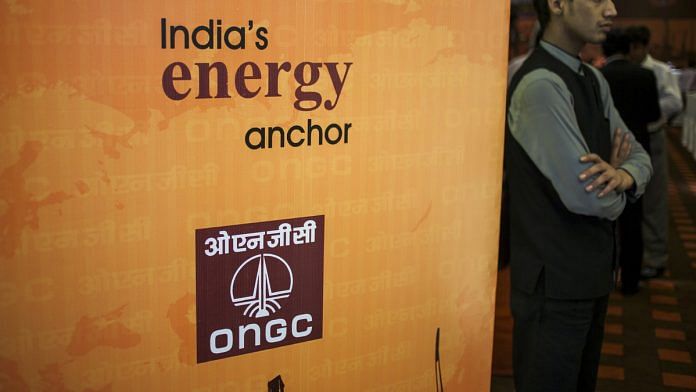Data shows market cap of large PSUs such as ONGC & BHEL have fallen between 25 & 40 per cent in the last 5 years.
New Delhi: Public sector banks have been in the news for their massive bad loans, falling performance and the resultant erosion in the worth of their publicly listed shares.
But turns out that this downturn in market capitalisation has not been limited to public sector firms in the financial services sector. An analysis by ThePrint has found that the market capitalisation of several state-owned non-banking behemoths has also declined significantly in the last five years.
Data collated by primary market tracker Prime Database shows that many large public sector units (PSUs) such as ONGC and BHEL have lost between 25 and 40 per cent of their market cap, giving negative returns to their shareholders since the Narendra Modi government took charge in 2014.
This, despite the benchmark Sensex and Nifty indices registering overall healthy performances and offering positive returns to investors.
In September 2014, the BSE Sensex closed above 27,000 points for the first time while Nifty surpassed the 8,000 level, also for the first time. Last Friday, the Sensex closed at 36,386.61 points while the Nifty touched 10,906.95.
Market cap is calculated by multiplying the number of a company’s outstanding shares by the current price of one share. It is the key metric to assess a listed company’s value.
Also read: How Modi can privatise PSU banks and still win 2019
Grim picture
The Bombay Stock Exchange’s PSU index has large power, oil and coal companies, besides government-owned banks.
Of these, Oil & Natural Gas Corporation Ltd, Coal India, Bharat Heavy Electricals, Oil India, Mahanagar Telephone Nigam Ltd, MMTC Ltd, and National Aluminium Co., have registered the most erosion in the value of their shares during this period.
“If one looks at the share of PSUs and public sector banks in total market cap, it has reduced to 7 per cent from over 28 per cent in 2009. This reflects the state of overall performance of these government companies,” said Pranav Haldea, managing director, Prime Database.
“PSU stocks have under-performed in all periods in the last five years due to corporate governance issues, and the fact that the actions taken by the majority shareholder — the government — may not always be in favour of the minority shareholders,” Deepak Jasani, head of retail research at HDFC Securities, told ThePrint.
Sample this: ONGC lost Rs 1,64,287.55 crore in market capitalisation between 30 September 2014 and 22 January 2019 — down to Rs 1,85,247 crore from Rs 3,49,534.55 crore.
Over the same time span, BHEL’s market cap has nearly halved — to Rs 25,865.01 crore on 22 January 2019 from Rs 49,062.14 crore on 30 September 2014, an erosion of Rs 23,197 crore.
It’s a similar picture for Coal India, which has witnessed an erosion of Rs 74,980.25 crore — down to Rs 1,40,628.85 crore from Rs 2,15,609.10 crore.
Also read: Going back in time – PSUs continue to call the shots in the defence ministry
The Nifty CPSE index too paints a grim picture. On 1 October 2014, the Nifty CPSE index was at 2,438.20 points, but by 17 January 2019, it came down to 2,045.10 points.
Equity analysts said PSUs, which are constrained by multiple government guidelines, are no longer perceived as wealth creators like private sector companies, which re-invest their profits to further and expand their business. Most PSUs that register high profits have typically handed over higher dividends to the government or even invested in cross equities and acquired other PSUs, they said.
Saurabh Jain, assistant vice president (research-retail equities), SMC Global Securities, said the global economy and commodity prices have also played a role in bringing down the market cap of PSUs.




Not to worry RIL share sky rated from around 950 level to over 1300 during Modi regime.
What else do we expect? We have a government that is obsessed with controlling the fiscal deficit and uses the public sector to declare dividends or buy back stock – when they should be investing for growth. Even a first year MBA student knows that growth is the biggest driver of value – stock prices.